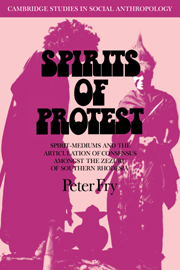 Spirits of Protest
Spirits of Protest Published online by Cambridge University Press: 08 March 2010
At the same time that Chiota was rapidly incorporated into the political and economic structures developed in the colony of Southern Rhodesia, it was also incorporated into Christendom by the mission activities of the Methodists, Roman Catholics and Anglicans who set up churches and schools throughout the area. However, just as many ‘tribal’ institutions have survived this process, so have the old religious beliefs and practices. Indeed they have done more than merely survive; in recent years they have acquired a new relevance as part of a process of cultural regeneration which accompanied the rise of African nationalism.
The main emphasis of this book is on the political significance of magicoreligious beliefs and I have tended to stress the way in which beliefs are manipulated in concrete situations. Middleton, in his analysis of Lugbara religion, went so far as to claim that Lugbara ‘have no set of interconsistent beliefs as to the nature of man and the world. Their beliefs are significant in given situations and their consistency lies in the way in which they are used in ritual action.’ (Middleton 1960 : 25). The Lugbara and the Zezuru in common with most non-Islamic African societies are lacking in specialised theologists and their magico-religious beliefs are essentially practically orientated notions which are brought into play to account for the many unfortunate events thrown up in day-to-day life. However, this does not mean to say that they do not follow certain basic structural principles. Evans-Pritchard observed that it was impossible for any one Zande to describe his beliefs in witchcraft in their totality.
To save this book to your Kindle, first ensure [email protected] is added to your Approved Personal Document E-mail List under your Personal Document Settings on the Manage Your Content and Devices page of your Amazon account. Then enter the ‘name’ part of your Kindle email address below. Find out more about saving to your Kindle.
Note you can select to save to either the @free.kindle.com or @kindle.com variations. ‘@free.kindle.com’ emails are free but can only be saved to your device when it is connected to wi-fi. ‘@kindle.com’ emails can be delivered even when you are not connected to wi-fi, but note that service fees apply.
Find out more about the Kindle Personal Document Service.
To save content items to your account, please confirm that you agree to abide by our usage policies. If this is the first time you use this feature, you will be asked to authorise Cambridge Core to connect with your account. Find out more about saving content to Dropbox.
To save content items to your account, please confirm that you agree to abide by our usage policies. If this is the first time you use this feature, you will be asked to authorise Cambridge Core to connect with your account. Find out more about saving content to Google Drive.